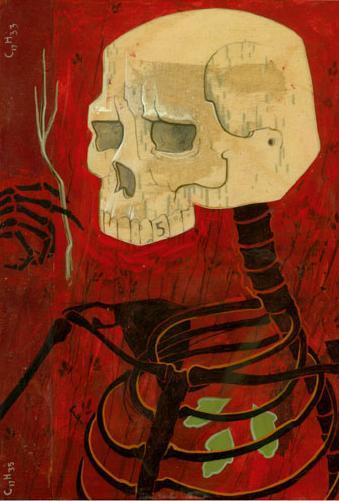
Before I started reading Tristram Shandy, I decided that the best way to do so would be to write it. The initial drive, the reason that I sought out the book to begin with, was because of a movie about the book that opened this week, Tristram Shandy: A Cock and Bull Story, starring Steve Coogan and directed by Michael Windterbottom, who also directed 9 Songs and 24-hr Party People. I, precedingly, had heard about the movie from reviews—reviews are inescapable in this era, they are ceded through all medias and avenues for those willing to give a fourth of a damn—and these reviews were on the whole positive. “Wonderfully absurd,” “mind-tickling” or “surprisingly unpretentious.” Everyone seemed to agree that Michael Winterbottom’s interpretation of the novel was at the least charming. Which is, I believe, a rare accolade for a movie with central metafictional elements: stories outside stories that are about the stories both, well, they tend to get the critical shaft.
And so, if I was to do the experience any justice, I had best write the story myself. I situated myself by the window of a local café (one that necessarily serves a decent array of liquors), and propped up a laptop and a used copy of Lawrence Stern’s most famous work. And, of course, I musn’t start at the beginning, so I flipped open to an arbitrary page and began typing the beginning of chapter 38 from Book III:
O Slawkenbergius! Thou faithful analyzer of my Disgrazias—though sad foreteller of so many of the whips and short turns which in one stage or other of my life have come slap upon me from the shortness of my nose, and no other cause that I am conscious of.
How fortuitous, right? What language, right off! Well, I suppose that it might have been luckier, or more apt, to come upon some passage about the beginning of something, or about the copying of something, or about some grad student in a Carolina café typing out a novel 200 years hence, but really, how much better can you get than Slawkenbergius? I didn’t even know what it meant! Who does?
Apparently not Microsoft Word. The mechanics of typing a novel have their own quirks, in comparison to the just the usual, lazy practice of reading it. The word processing program I was using to type the book out (good thing it was doing the processing, because I was doing less and less) was having problems with names like Slawkenbergius, or Prignitz, or 19th century conventions like heard’st and sensorium and makind—oops, that last one was just an unfortunate misspelling of mine. It did, however, redress my incorrect ‘cooly’ as ‘coolly.’ Give and take, my friends, give and take.
And so, as the typing and the drinking ran on in concert, the book and the experience flowed together in an every more lucid and shallow café experience. The this’ turned into his’, my ‘collusions’ turned into ‘collisions,’ and I was no longer able to guess the smudged words of my 2nd-hand text. Oddly, the spelling of Slawkenbergius became easier as time progressed. Perhaps, or perhaps not, I lost the narrative thread. Perhaps, because I found myself being distracted by nearly every moving object in my periphery, yet perhaps not, because when I was done staring at the perpetual motion alloy rims and looked back at the book, I started noticing the metafictional elements sentence-by-sentence, word-by-word. Not only references to the work under discussion, but questions of method, of binding, of production and post-production, and commentaries from also-fictional literary colleagues and critics. And reviewers.
After such a stunning luck with the invectives at the beginning of the chapter, the machinations underway in the story quickly made apparent that this was a disastrous way to begin this particular book. Already I’m in the middle of the career of the author’s literary alter-ego, well past the trappings of his youth and his introduction to the age of discernment. Suddenly I’m reading about the main opus of this fictional author Slawkenbergius, a book described by Sterne as ‘a thorough-stitched digest…comprehending in it all that is or can be needful.’ I was face first with the same elements and themes that were in my head before i opened the book: the completeness of literature, the potentials of such, and the examination of such by others post-production. Which, in some way, is great: I’ve never got exactly what I wanted out of a book so quickly. Given the stated aims of this here experience (ok, unnecessary confession, the first sentence of this entry was written before the book was open), I only had to read a few sentences to get reference to a nonexistent digest which contained so prodigious a source of knowledge.
Of course, when I found out what that great compendium was actually about—actual noses—my lucidity and my understanding began a slow decent back to earth, and I decided to hold off on the ale and opt for caffeine. For the best, I am sure. One of the main trappings of a metafictional book is its lack of concreteness, and so it was a relief to know that I might learn a bit more than my own awareness of reading (and, of course, writing) Tristram Shandy.

1 comment:
wow wow wow! back to blogging with a vengeance.....i'm going to have to read Tristram Shandy now (and this time maybe i really will).
can you please explain more about writing the book to read it?
yes. noses. it's all about noses. and it's actually an eighteenth century text, the first "postmodern" novel (except of course it isn't at all).
Tristram Shandy should help, or at least be obvious, if/when you read Rushdie's Midnight's Children (which is a fantastic book).
please keep shandy-blogging. maybe if you write enough i won't ever have to really read the book myself.
Post a Comment